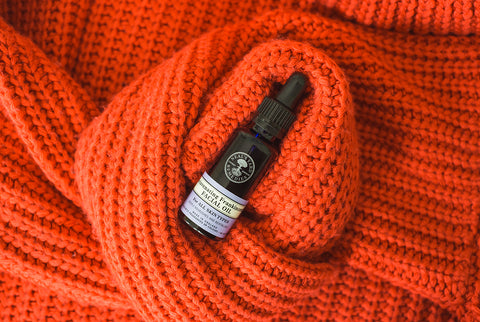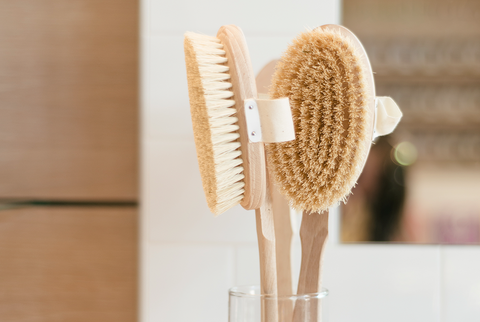“Putting oils on my face? Won’t that make my skin more… oily?”
Common sense tells us that applying oils to our skin will cause us to look more oily — something that most of us will actively avoid. Contrary to this, however, using a good facial oil won’t leave your skin clogged, shiny, or cause it to breakout.
Practically anyone can use facial oils as a beneficial part of their skincare routine. The hydrating benefits are real, but facial oils can also boost your skin’s natural glow and keep it protected against pollutants and harsh weather. For skin that is nourishing, glowing and protected, facial oils are definitely worth considering!
What is a facial oil, exactly?
It is important to note that when discussing facial oils, we’re not talking about the bottle of extra virgin olive oil you keep in your cupboard. Facial oils are specially formulated with one or a combination of plant oils that can be used on the skin, and are full of omega-rich oils, vitamins and antioxidants. They deliver hydration, moisturization, and nourishment, which help to plump the skin and add immediate vitality and radiance.
Facial oils are emollients, which means that they work as an occlude, humectant, and a lubricant at the same time — meaning they provide a layer of oil on the skin’s surface (slowing down water loss), enhance the skin’s capacity to hold water, and reduce friction when anything rubs against the skin. When your skin dries out, causing it to crack and flake off, it leaves open spaces between the cells in your skin. Emollients fill those spaces with fatty substances that make your skin smoother and softer, and then seal the water into your skin, helping keep your skin hydrated for longer.
The molecules that comprise facial oils are amazingly similar to those that make up the sebum that our skin naturally produces. This means that facial oils work with our skin, not against it—when you give your skin an ingredient it already knows how to use, you provide it with highly usable nutrients that your skin ‘thinks’ it made itself. This makes facial oils exceptionally gentle, kind, and effective.
Facial oils work well with every skin type — yes, even those with oily skin! In fact, if it’s overall shine you’re worried about, adding the right oils to your routine can actually reduce your oil and sebum production. Overall, facial oils help to rebalance skin and restore a healthy complexion.
When should I use a facial oil?
Facial oils are gentle enough to be used daily, and they are most effective when used as a part of a broader skincare regimen—after using a cleanser and serum, and before a moisturizer or night cream. The oils will help lock the serum’s nutrients into the skin, and will help prep for a deep and effective absorption from your moisturizer. We find it can be helpful to think of your serum, facial oil and moisturizer like garments of clothing you put on while getting dressed, each layer serving its own unique purpose in the overall outfit.

After cleansing, toning and applying your serum, simply add a few drops to your fingertips and massage in, using an upwards circulation motion, taking care around the delicate eye area. For a glowing complexion, make sure to follow with a moisturizer or night cream of your choice.
How will it benefit my skin?
Facial oils are powerhouse products that will leave your skin with enhanced elasticity, suppleness, tone and hydration. They work fabulously for all skin: mature skin, parched skin, dull skin, oily and blemish-prone skin, and combination skin.
Reduce the appearance of fine lines and wrinkles — choose a facial oil packed with antioxidants, which work to prevent further aging.
They’re great for dry skin — especially as we enter the colder months. Plummeting temperatures and heaters set on high work to suck moisture straight from our sky, which is why most people will experience increased dryness during this time of the year. Facial oils help to replenish skin’s natural moisture levels while helping protect it from future moisture loss.
They protect your skin from harmful pollutants — because oils are lipophilic, they can penetrate deep into the skin to trap water and other nutrients in, while keeping toxins from our environment out. This is especially important for big city dwellers who need extra protection against pollutants and smog (known causes of unwanted wrinkles).
What facial oil is right for me?
We’re proud to carry a range of facial oils that are certified organic and safe for sensitive skin. Whether you’re looking to reduce redness, deeply hydrate or lessen fine lines and wrinkles, our plant-based oils are here to help.
Dry, dehydrated skin
Orange Flower Facial Oil — This award-winning, skin-quenching facial oil replenishes dry skin types. With nourishing neroli oil, distilled from the blossom of the bitter orange tree, and a blend of omega and antioxidant-rich botanical oils, it also helps to protect against premature aging, making it beneficial for younger skin.
Mature skin
Frankincense Facial Oil — This rich and revitalizing best-selling facial oil moisturizes and rejuvenates all skin types, as well as those who are experiences signs of aging. With a blend of toning frankincense and organic omega-rich botanical oils, it also helps to reduce the appearance of fine lines and wrinkles.
Normal Skin
Rose Facial Oil — This best-selling balancing facial oil infuses soothing damask rose and organic oils to give normal skin types a natural revitalizing boost. It soothes whilst balancing skin’s natural moisture levels, and is rich in essential nutrients, antioxidants and vitamins.
Sensitive skin and/or prone to rosacea
Rosehip Oil — This vitamin- and antioxidant-packed oil is an excellent source of essential fatty acids, which help promote the production of prostaglandics involved in tissue healing and regrowth. The fatty acids also help to promote cellular development and collagen synthesis, which is important for keeping skin smooth and supple.
Oily skin
Jojoba Oil — Odourless and incredibly light, jojoba is technically a wax that is well-known it’s molecules that are incredibly similar to the ones of sebum, the oil our skin produces naturally. This means it’s less likely to cause irritation and will absorb quickly into your skin without leaving a greasy build-up, while tricking your skin into thinking its produced enough oil of its own.
Will you be adding these nourishing must-haves to your fall skincare routine? Let us know in the comments below! And, as always, if you need any help deciding which products are best for you, please do not hesitate to contact us — we'd love to help.



